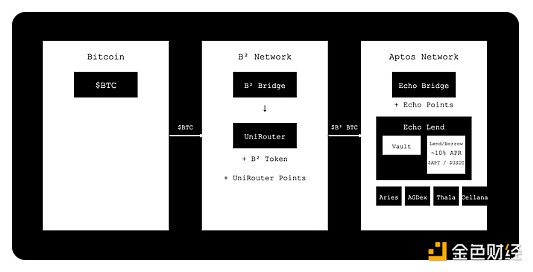Author: NingNing, Source: Author's Twitter @0xNing0x
The competition between Aptos and Sui for the top position in the Move ecosystem has been very fierce. They have launched a full-scale war in terms of consensus algorithms, developer community building, business resources, etc. In terms of the choice of ecological development direction, the two have taken completely different routes. Sui chose the realistic route to focus on incubating DeFi and Meme projects, while Aptos chose the idealistic route to layout the Bitcoin ecosystem.
Aptos @Aptos's Bitcoin ecological strategy is currently "walking on two legs". One leg is the cooperation with the old Bitcoin Layer2 Stacks, which quickly cuts in with its mature technology and user base; the other leg is to carry out in-depth cooperation with the newcomer B² Network to obtain the growth dividend of the new paradigm Bitcoin L2. And the protagonist we are going to focus on today - Echo Protocol @EchoProtocol_, is an important chess piece in the big chess game of Aptos<>Bitcoin.
Echo Protocol has a deep relationship with B² Network. As an important member of the B² Network ecosystem, Echo has taken on the responsibility of bringing BTC into the Aptos ecosystem. Interestingly, this small and beautiful project has attracted an unexpected investor - "Little Black Brother" Arthur Hayes.
Why does Arthur Hayes favor Echo Protocol? The answer may be hidden in one of his bold predictions. Hayes believes that in the current market cycle, Aptos may outperform Solana and is expected to become the second largest Layer1 public chain after Ethereum within one to three years. And Echo Protocol is undoubtedly the perfect link between Aptos and Bitcoin, the two tracks he is optimistic about.
So, what is so special about Echo Protocol?
First of all, Echo is not a simple BTC bridge tool, but a full-range protocol that integrates BTC bridge, liquidity pledge, Restaking and yield optimization. This "one-stop" service model greatly reduces the user's operation threshold and improves the efficiency of capital use.

Even more impressive is Echo's "real income" model. Unlike the flashy "points incentives" on the market, Echo provides users with up to 10% actual annualized returns through in-depth cooperation with Aptos. These returns are distributed monthly in the form of APT tokens, calculated based on the USD value of the BTC staked by the user. This model not only creates a stable cash flow for BTC holders, but also introduces a large number of high-quality assets to the Aptos ecosystem, which can be said to kill two birds with one stone.
Echo's ambitions do not stop there. The project plans to build a multi-level reward ecosystem by introducing Bsquared and the upcoming Babylon points. Users can choose between different token rewards according to their preferences, while enjoying basic APT income. This flexible reward mechanism will undoubtedly greatly stimulate the enthusiasm of users to participate.
In terms of risk control, in addition to the conventional DeFi risks, there is almost no other risk for users to stake BTC on Echo. This low-risk and high-return model reminds people of MakerDAO's treasury bond income project. Echo is bringing institutional-level stable income to ordinary users, which is undoubtedly of great appeal in the current market environment.
For miners and large BTC holders, Echo is even more significant. Against the backdrop of the upcoming Bitcoin halving cycle, Echo provides them with a new option to generate stable income without selling BTC. This not only supplements the ecology of projects such as BRC20 and Runes, but also injects new vitality into the entire Bitcoin economy.
Echo's market performance also confirms the feasibility of its model. At present, Echo has attracted 2,000 BTC in deposits, which is undoubtedly a brilliant achievement in the current market environment. These users are enjoying the real benefits of their "digital gold" safely through Echo.
However, Echo's ambitions are obviously more than that. The whitelist event that the project is about to launch will introduce more active users to the ecosystem. Participants can not only enjoy up to 10% of the benefits and 1.5 times the Echo points, but also have the opportunity to obtain special Discord roles. This community incentive mechanism will create a more active and loyal user group for Echo.
It is worth noting that the deposit limit for this round of activities is 500 BTC, which will be opened at 2:00 UTC on October 28, first come first served. For users who do not have BTC, Echo also provides a solution - they can exchange USDC, USDT or APT for aBTC on the two DEXs Aries and Cellana, and then participate in staking.
In this rapidly changing crypto world, Echo undoubtedly represents a bold attempt and a gamble. It not only bets on the future of Aptos, but also on the position of Bitcoin in the new generation of public chain ecology. Let us wait and see what the final result of Arthur Hayes's gamble will be.
 Weatherly
Weatherly







